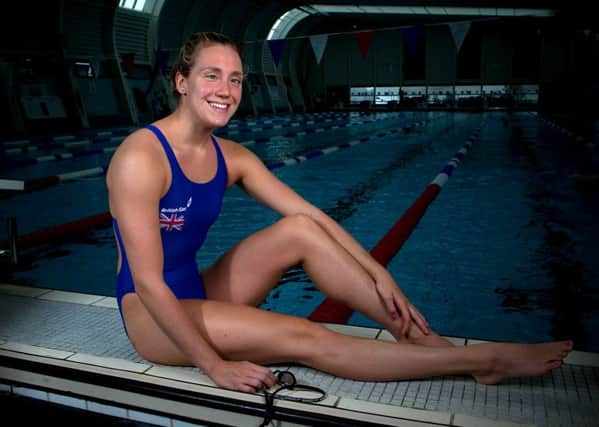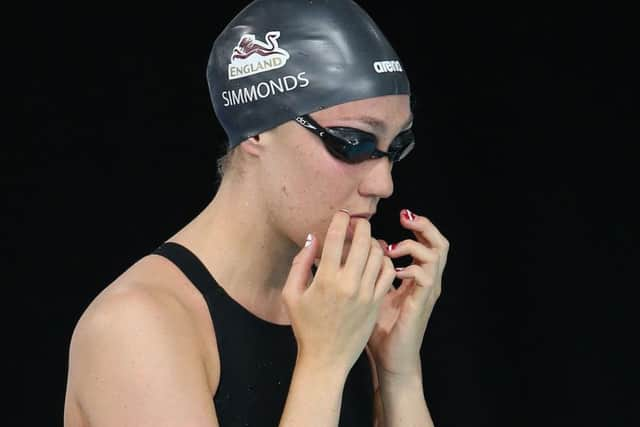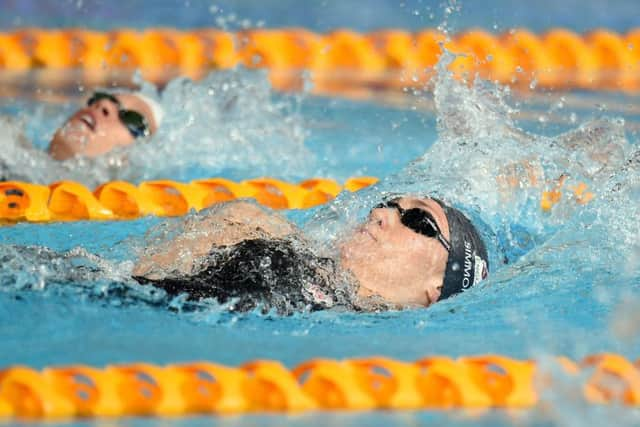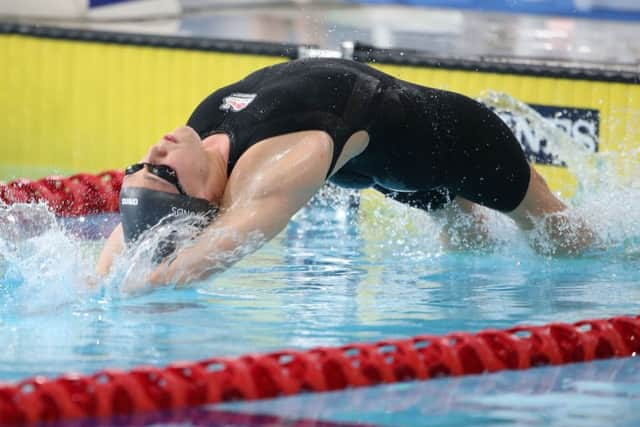Weekend Interview: Lizzie Simmonds keeping her head above water for the final splash


When that gathering is in Rio, the carnival capital of the world, then the opportunity is one not to be missed. British swimmers certainly had a ball – from Adam Peaty to Jazz Carlin, Siobhan Marie O’Connor to the freestyle and individual medley relay teams, the 2016 Summer Olympics was a meet when Team GB reclaimed a little pride that had been lost in their home Games four years earlier.
But for those who missed out, narrowly so, Rio was a difficult experience, especially for a British champion just four months earlier, and a two-time Olympian who had come within three-quarters of a second of winning a bronze at the London Aquatics Centre in 2012.
Advertisement
Hide AdAdvertisement
Hide AdThat was the scenario that Lizzie Simmonds had to stomach last summer, as she sat at home and watched – through a pained expression – the heats, semi-finals and final of the 200m backstroke competition in Rio.


Simmonds had won the British title in a time of two minutes 09.24 seconds in Glasgow in April, a time that would have been good enough for a spot in the semi-final line-up at least, in that summer’s Olympics.
Yet she did not meet the strict qualifying criteria set by British Swimming, so despite being the country’s best she was not taken to Rio and Great Britain had no representative in the 200m backstroke in Brazil – while nations like Indonesia and Turkey did in a field of 28.
Simmonds’s case falls right in the middle of the age-old debate about whether UK Sport should only fund and take those they consider potential medallists to an Olympic Games. Should British sport have a winner-takes-all mentality or be more inclusive to outside bets?
Advertisement
Hide AdAdvertisement
Hide AdHaving swam better than her qualifying times in her two previous Olympic experiences – making finals in both 2008 and 2012 – Simmonds, a two-time European champion, felt hard done by.


“I wasn’t necessarily angry, more disappointed it went that way,” says the 26-year-old, who was born in Beverley.
“At an Olympic Games, I believe, you should have someone representing the country. For the people back home it was sad to not have that representation, but the selection policy is the way it is for a reason, to eliminate people they don’t think are going to medal.
“From my perspective, if you’re in the Games and you’re in the race then you have a chance, so I don’t necessarily agree with that. But it’s the way it is and the way sport goes sometimes.
Advertisement
Hide AdAdvertisement
Hide Ad“British Swimming had very tough qualifying standards, I think the time was top-five, top-eight in the world at the time.


“My performance on the day of the British Championships didn’t live up to those standards and it was off my best time anyway, so I was disappointed not to have swum quicker and secured my place on the team.
“I had to understand that that is sport, and you have to draw a line somewhere. They’d decided they wanted to take a relatively small team. For them, it was worth having that really concentrated pool of athletes.
“From an athlete’s perspective, there’s a lot of pressure on at trials and the racing can have any number of outcomes, whereas when you get to the Games, everybody stands up and pulls performances out of the bag.
Advertisement
Hide AdAdvertisement
Hide Ad“In both of the Olympics I have been to I was ranked much lower going in than I ended up finishing, so, on both occasions, I improved on my ranking.


“That’s what the Olympics does, through the atmosphere and the occasion, it elevates you.”
The disappointment of a missed Olympics led to a period of soul-searching for Simmonds.
She was approaching her 26th birthday – young in the real world, but relatively old in competitive swimming – so naturally contemplated retirement. But when she looked at the medals hanging in her cabinet – golds, silvers and bronzes from European, world short-course and Commonwealth Games meets – she decided to give it one more shot.
Advertisement
Hide AdAdvertisement
Hide AdPeripatetic by nature, having moved from Beverley to Lincoln before living and training in Loughborough and then Bath, she took the decision just last month to move to Edinburgh to give her swimming career one more go.
She has relocated to a new training base at the university campus under a new coach from Australia, whom she hopes might trigger a renaissance.
Simmonds has lost the funding of UK Sport so is living on the breadline, stepping up her ambassadorial appearances and taking swimming classes to help keep her head above water.


The British Championships at Ponds Forge in Sheffield next month may come too quickly for her, but the key for Simmonds on the final lap of her career is not putting too much pressure on her shoulders.
Advertisement
Hide AdAdvertisement
Hide Ad“Put simply, I’m not sure whether I can still swim the times and put in the performances I could when I was younger, before London and the Europeans in 2010, but it’s definitely worth me trying to find that out before stopping,” she says.
“It might be a case that I can’t, but I have to find that out myself, and the only way to do that is to move programme and try something new, try something that’s, hopefully, a bit more suited to me.
“Best-case scenario, I swim very fast again; worst-case, I don’t, and that’s when I will stop in the knowledge that I had done everything I could.
“My next proper goal would be the Commonwealth Games next April. If I don’t make that, or I didn’t swim well there, then that would probably result in me calling it a day then.”
Advertisement
Hide AdAdvertisement
Hide AdIf that is the case, like all sensible athletes, Simmonds has already started lining up her next challenge.
Amid the disillusionment last autumn, Simmonds put her name forward to be swimming’s representative on Team GB’s athletes commission, which provides a voice for active competitiors at the British Olympic Association.
“We represent the interests of the athletes that are currently competing, to make sure they are at the heart of every decision the BOA makes,” adds Simmonds, who wanted to stand up for the rights of her peers.
“There’s a lot of contentious topics in sport. More work needs to go into athlete well-being and also making sure athletes are prepared for the transition after sport. If you retire, get injured, or get cut from funding – what happens next? Is there a duty of care set up for athletes going through that process?
“As I’ve been finding out these last few months, it’s a huge concern.”